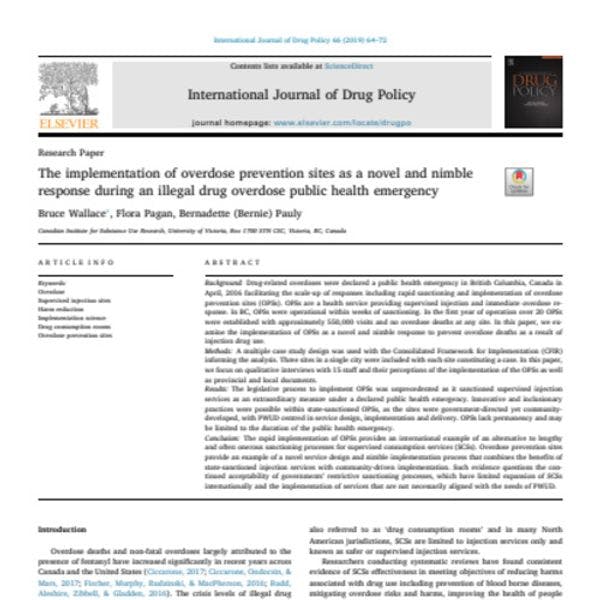CC Bruce Wallace et al.
Mise en œuvre de sites de prévention d’overdoses comme réponse nouvelle et souple à une urgence de santé publique
La mise en œuvre réussie de ce genre de sites en Colombie Britannique met en question les longs obstacles bureaucratiques entravant à ces initiatives de réduction des risques. Pour en savoir plus, en anglais, veuillez lire les informations ci-dessous.
By Bruce Walace, Flora Pagan and Bernadette Pauly
Drug-related overdoses were declared a public health emergency in British Columbia, Canada in April, 2016 facilitating the scale-up of responses including rapid sanctioning and implementation of overdose prevention sites (OPSs). OPSs are a health service providing supervised injection and immediate overdose response. In BC, OPSs were operational within weeks of sanctioning. In the first year of operation over 20 OPSs were established with approximately 550,000 visits and no overdose deaths at any site. In this paper, we examine the implementation of OPSs as a novel and nimble response to prevent overdose deaths as a result of injection drug use.
A multiple case study design was used with the Consolidated Framework for Implementation (CFIR) informing the analysis. Three sites in a single city were included with each site constituting a case. In this paper, we focus on qualitative interviews with 15 staff and their perceptions of the implementation of the OPSs as well as provincial and local documents.
The legislative process to implement OPSs was unprecedented as it sanctioned supervised injection services as an extraordinary measure under a declared public health emergency. Innovative and inclusionary practices were possible within state-sanctioned OPSs, as the sites were government-directed yet community-developed, with PWUD centred in service design, implementation and delivery. OPSs lack permanency and may be limited to the duration of the public health emergency.
The rapid implementation of OPSs provides an international example of an alternative to lengthy and often onerous sanctioning processes for supervised consumption services (SCSs). Overdose prevention sites provide an example of a novel service design and nimble implementation process that combines the benefits of state-sanctioned injection services with community-driven implementation. Such evidence questions the continued acceptability of governments’ restrictive sanctioning processes, which have limited expansion of SCSs internationally and the implementation of services that are not necessarily aligned with the needs of PWUD.
